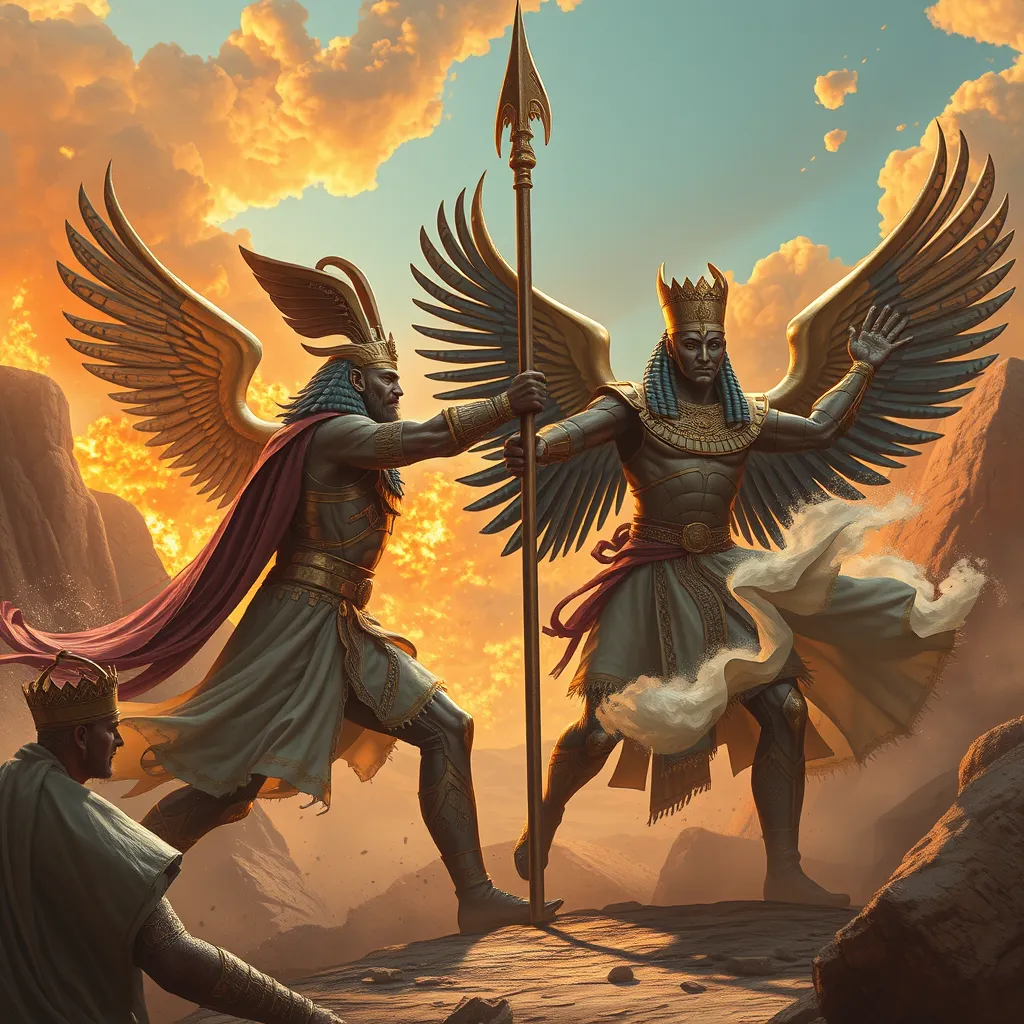The Battle of Horus and Seth: The Epic Struggle for the Throne of Egypt
I. Introduction
The Battle of Horus and Seth stands as one of the most significant narratives in Egyptian mythology, encapsulating the timeless conflict between order and chaos. This epic struggle involves two of Egypt’s most powerful deities: Horus, the god of the sky and kingship, often depicted as a falcon, and Seth, the god of chaos and disorder, associated with storms and the desert.
This article aims to explore the intricate layers of mythological, cultural, and historical implications stemming from the battle between these two gods, shedding light on how their conflict shaped ancient Egyptian society and continues to resonate in modern times.
II. Historical Context of Ancient Egypt
To understand the significance of the Battle of Horus and Seth, it is essential to consider the historical landscape of ancient Egypt. During the time of this myth, Egypt was a civilization deeply rooted in the concept of divine kingship, where pharaohs were seen as the earthly embodiment of the gods.
The political structure of ancient Egypt was characterized by:
- A centralized authority under the pharaoh.
- Religious institutions that reinforced the divine right of kings.
- Mythology used as a tool for legitimizing rulers and their actions.
In this context, the myth of Horus and Seth served not only as a tale of conflict but also as a means of justifying the pharaoh’s rule and the stability of the kingdom.
III. The Mythological Background
The origins of Horus and Seth are deeply intertwined, as they are both sons of Osiris, the god of the afterlife, and Isis, the goddess of motherhood and magic. Their rivalry began with the death of Osiris at the hands of Seth, which set off a chain of events that would culminate in the epic battle for the throne of Egypt.
Key themes in the myth include:
- Order vs. Chaos: Horus represents order, rightful kingship, and the establishment of harmony, whereas Seth embodies chaos, violence, and disorder.
- Life vs. Death: The struggle mirrors the cycle of life and death, with Horus symbolizing life and renewal against Seth’s association with death and destruction.
IV. The Nature of the Conflict
The conflict between Horus and Seth was not merely a series of physical confrontations; it involved a range of challenges and contests that tested their strength, wits, and divine favor. The battles were characterized by:
- Physical Battles: These included fierce combat where Horus often emerged victorious, showcasing his strength and determination.
- Trickery and Deception: Both gods employed cunning strategies to outsmart each other, reflecting the unpredictable nature of their conflict.
- Divine Intervention: Other deities, such as Thoth, the god of wisdom and writing, played roles in mediating disputes and providing counsel.
The complexity of their battles underscored the multifaceted nature of their struggle, emphasizing that the fight for the throne was as much about wisdom and strategy as it was about brute strength.
V. Cultural Representations of the Battle
The Battle of Horus and Seth has been depicted extensively in ancient Egyptian art and literature. Temples, tombs, and artifacts often featured scenes of the gods in combat, showcasing their significance in the cultural imagination.
Key cultural representations include:
- Artistic depictions in murals and sculptures that illustrate their confrontations.
- Literary texts that recount the myths, emphasizing moral and ethical lessons derived from their conflict.
- The integration of the battle into religious practices, where rituals were performed to honor Horus and seek his protection against chaos.
In modern times, the myth has found new life in various adaptations, influencing literature, films, and even video games, demonstrating its lasting impact on popular culture.
VI. The Outcome of the Battle
The climax of the conflict resulted in Horus’s ascension to the throne, a momentous occasion that had far-reaching implications for both the gods and humanity. Horus’s victory symbolized the restoration of order and the rightful claim to kingship.
Implications of this outcome included:
- The establishment of Horus as a symbol of divine kingship within the Egyptian pantheon.
- A shift in the balance of power among the gods, with Horus representing stability and legitimacy.
- The reinforcement of the pharaoh’s authority, as rulers were often seen as the living embodiment of Horus, ensuring the continuation of divine order.
VII. The Legacy of Horus and Seth
The legacy of the Battle of Horus and Seth has endured throughout Egyptian history, influencing culture and identity. The themes of the myth resonate with contemporary discussions on leadership, morality, and the struggle between good and evil.
Key aspects of this legacy include:
- The continued relevance of the myth in understanding leadership dynamics and the moral responsibilities of rulers.
- Connections to modern narratives of conflict, illustrating the timeless nature of the struggle between order and chaos.
- The myth’s presence in modern media, from films to literature, showcasing the enduring fascination with these archetypal figures.
VIII. Conclusion
The Battle of Horus and Seth is more than just a myth; it is a profound narrative that encapsulates the essence of ancient Egyptian beliefs and values. Through the lens of this epic struggle, we gain insights into the importance of order, morality, and the complexities of leadership.
As we reflect on the lessons learned from this ancient conflict, we are reminded of the rich tapestry of Egyptian mythology and its relevance in our understanding of human nature and society today. Appreciating these stories allows us to connect with the past and recognize their significance in the ongoing narrative of humanity.




